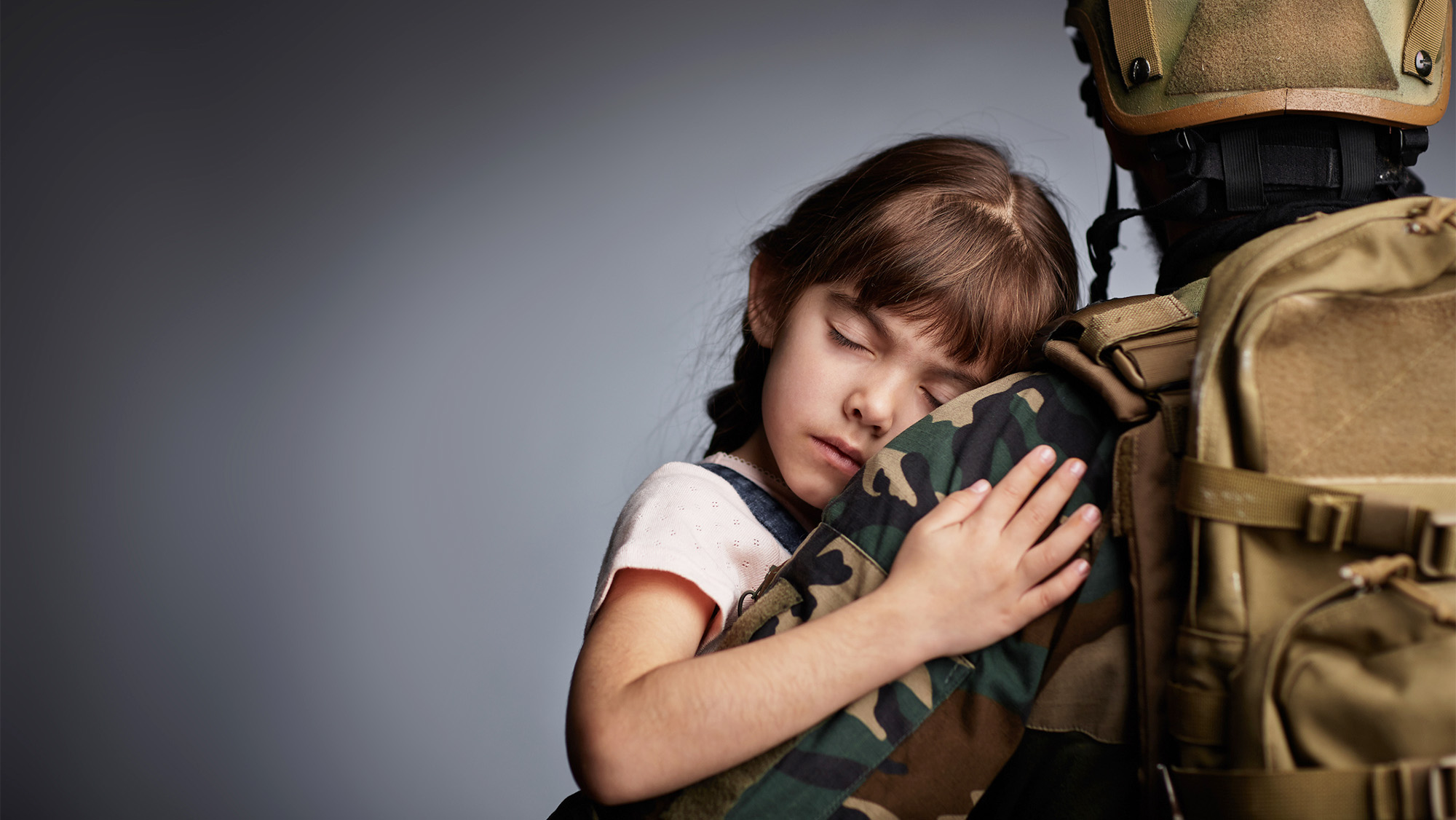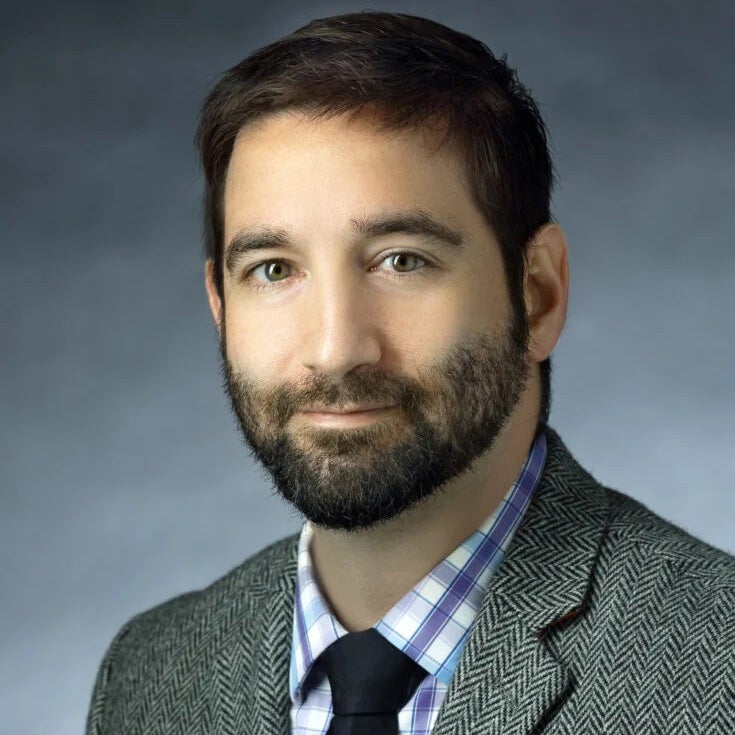Georgetown Team Leads Transformative Effort to Improve Mental Health Support for Military Families

Posted in GUMC Stories | Tagged child and adolescent mental health, mental health, military families, mind
Editor’s Note: Only the first name of subject of this article is used to protect her privacy. This article mentions mental health topics including self-harm and suicide. If you or someone you know may be considering suicide or is in crisis, call or text 988 to reach the Suicide & Crisis Lifeline.
(March 7, 2024) — When Sarah engaged in self-harm for the first time, she was in seventh grade. She lived with her family in Virginia, where her father was stationed with the Army. Throughout her young life, the military moved her family, or sometimes just her father, around the world to places where his expertise was needed — Japan, Germany, Guatemala.
The many times that Sarah’s family was uprooted during her adolescence were the most challenging. Within a decade, Sarah moved from Virginia to Missouri, Alabama then Colorado. Even though she struggled with feelings of isolation and loneliness, as well as bulimia, depression and anxiety, Sarah says she received inadequate mental health care.
“I went to a counselor once after cutting my wrist,” Sarah recalls. “In Alabama, I went to a counselor several times to help with my bulimia. But in Colorado, my mental health wasn’t discussed by my parents or doctors. It seemed like no one knew what to do.”
That’s when she turned to heroin for relief, launching her prolonged battle with addiction.
Stories like Sarah’s are not unusual; adolescent mental health challenges are common among U.S. military families. But a new transformative effort led by Georgetown University aims to help change the intervention and treatment paradigm. Through $3.5 million in federal funding, Georgetown child and adolescent psychiatry experts Matthew G. Biel, MD, MSc, professor of psychiatry and pediatrics, and the Marriott Chair in Child, Adolescent, and Family Mental Health, and Sean Pustilnik, MD, assistant professor of psychiatry and pediatrics, will lead four large initiatives to help expand services and support to address adolescent mental health in military families.
Bleak Statistics

Poor mental health in children affects almost half of all military families. A recent survey conducted by the Blue Star Families organization (Military Family Lifestyle Survey) brings sharp focus to mental health challenges in active-duty families.
The results show 43% of families surveyed rated at least one of their children’s mental health as “fair,” “poor” or “very poor” — reflecting the high need for more mental health resources.
The reasons given for the high rates of poor mental health vary, but often include disruptions and distress caused by frequent moves, deployments, change of schools and other factors related to military life.
Families cite barriers to care as another reason for poor mental health. In the survey, 16% of families with at least one child in grades K-12 reported that they would like their child to receive mental health care, but such care was not being provided. This is one of the areas of focus for the Georgetown team.
A team led by Biel and Pustilnik will center the new work around ensuring military families and providers have the tools they need to provide mental health care. The work is divided into four projects utilizing different strategies, each leveraging telehealth or other technologies. The focus of the work in 2024 is primarily happening in Virginia, home to 27 military facilities.
Sharing Mental Health Expertise

One of the projects is designed to help primary care providers and general practitioners who take care of military families develop more adolescent mental health care expertise. Using a virtual platform, the Georgetown team will provide expert training on depression, anxiety, suicide prevention, substance use, trauma, social media and other relevant topics.
“Our team members are experts in adolescent mental health care, and we’re so very pleased to have a way to share our expertise and help train our colleagues across a whole spectrum of general mental health needs that commonly present in the primary care clinic,” says Biel, who is also vice chair and division chief of child and adolescent psychiatry at MedStar Georgetown University Hospital. “We’ll be able to help them build effective processes to screen adolescents, develop initial diagnostic impressions, make appropriate referrals, and provide brief interventions that can be done in the office prior to a referral. We’ll also help share best practices on how to educate and inform kids and their families about mental health.”
A second project uses the same format for training health care providers and applies it to schools serving children of military families.
“We’ll be doing a similar kind of training for teachers, guidance counselors, school social workers and school administrators around how mental health issues affect adolescents in school and what schools can do to support kids who have mental health needs in the learning environment,” Biel says.
Digital Library
The Georgetown team will also work to provide vetted resources on mental health care for adolescents and their parents, teachers and health care providers. In addition, Georgetown will develop a series of videos, web-based media and other educational materials to inform health care providers, educators and young people, as well as their parents and caregivers, about mental, emotional, developmental and behavioral health topics.
“Our digital library pulls together information about mental health conditions: about how they present, what treatment looks like, how to get good treatment, how to evaluate the effectiveness of treatment, what parents can do at home to help to support mental health of their kids, and how kids can support their peers,” Biel says.
Furthermore, the team will explore how to connect providers who serve military families with existing telehealth hotlines that provide primary care practices with real-time consultation with child psychiatrists.
“These consultation programs are excellent, but we’ve discovered they’re not often called upon to provide support to providers who take care of military kids, and we don’t really know why,” Biel says. “If we can understand why they don’t use these programs, we can find ways to make this outstanding service more accessible.”
Sarah Today
Biel says Sarah’s story is a sad reflection of the significant improvement in care needed to support the adolescents and their families in military communities.
As a young adult, Sarah finally got the help she needed and now, at age 29, she remains drug-free. Her mental health challenges persist, but she manages her anxiety and depression with medication and counseling.
“Not everybody makes it,” Sarah says. “I wouldn’t wish this on anyone. I would love for the story of my experiences to help other people.”
“Military families sacrifice so much for our country,” Biel says. “We owe it to them to find better ways to support their children and to help their families to thrive.”
